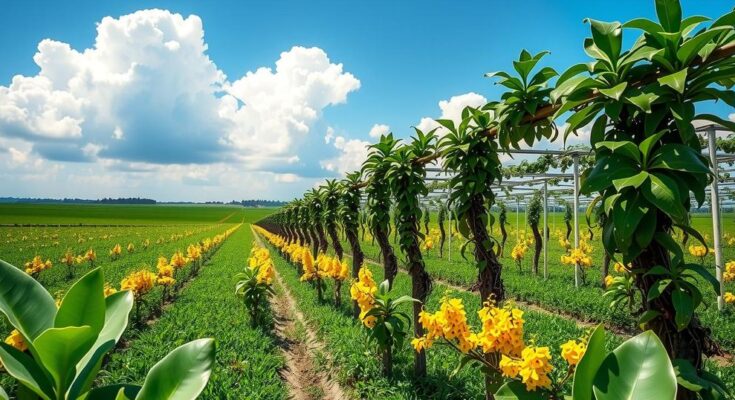Farmers in Madagascar are struggling to adapt to climate change impacts, with many acknowledging difficulties due to shifting weather patterns yet few taking action to change their practices. Financial constraints impede adaptation, as does a lack of support. The study aims to identify viable strategies for enhancing resilience among these small-scale farmers.
Recent studies reveal that farmers in Madagascar, particularly in Sarahandrano and Mandena, are confronting significant challenges due to climate change, with nearly all reporting adverse shifts in temperature and rainfall. Despite these hardships, few farmers are changing their agricultural practices to adapt. This information stems from interviews conducted in 2023, as these farmers primarily cultivate vanilla beans along with other crops such as rice and bananas on small lands, using traditional hand tools.
Farmers have observed escalating weather-related issues, including dwindling water supplies, a reduction in farming time, and increased pest populations, which have led to heightened incidences of illness, notably malaria and diarrhea. Charles Nunn, a senior co-author of the study, indicated that about seventy-five percent of survey respondents acknowledged these adverse changes. Yet, only 20% have implemented adaptive strategies, which is significantly fewer compared to studies conducted in other countries, as noted by Duke Ph.D. student Tyler Barrett.
Financial constraints are a major barrier to adaptation, with wealthier individuals more likely to adopt new practices. Approximately four-fifths of Madagascar’s populace lives below the poverty line, which limits access to resources for alternative farming methods. Professor Randall Kramer emphasized that many adaptive practices impose additional financial burdens on farmers, and thus, supportive programs are critical for those with limited means.
The study suggests alternative agricultural practices, such as integrating fruit trees or aquaculture in flooded rice paddies, enhancing food security and aiding in pest control. As noted by Voahangy Soarimalala, these measures could be beneficial, but farmers already endure a range of environmental risks, including frequent cyclones that devastate crops and infrastructure.
In a broader context, the unprecedented changes in climate have been noted throughout Madagascar, with evidence showing increased temperatures and decreased precipitation over the past 50 years. While small-scale farmers contribute significantly to the global food supply, they remain extremely susceptible to climatic changes. The team plans to expand its survey to 34 villages to explore these trends further and analyze the impacts of adaptation measures on farming communities.
Professor Kramer warned that farming in the face of climate change necessitates greater adaptability and risk-taking, presenting a dire concern for farmers whose annual success directly affects their families’ sustenance. The continued support and funding from ecological and evolutionary research programs are critical to addressing these challenges effectively.
In summary, farmers in Madagascar are facing dire challenges posed by climate change, with many struggling to adapt their practices despite recognizing the difficulties. Financial limitations significantly hinder adaptation efforts, highlighting the need for supportive programs. As the situation evolves, understanding and addressing farmers’ needs will be crucial to securing their livelihoods and ensuring food security in the region.
Original Source: today.duke.edu




